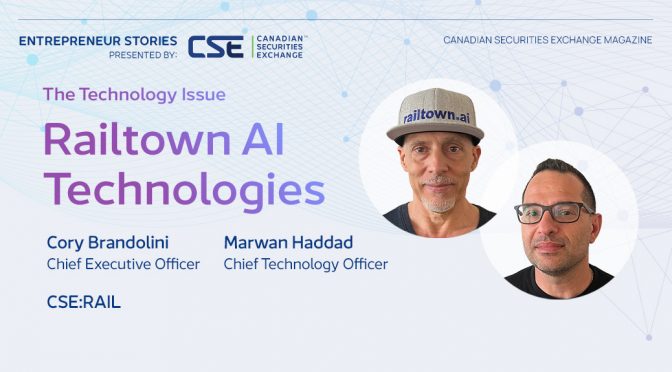Artificial intelligence is everywhere right now, and in the tech sector, thousands of entrepreneurs are looking for a way to plug AI into their business models.
The problem is that anyone who’s gone back and forth for more than a few minutes with a bot such as ChatGPT knows one thing: its responses are full of errors.
For AI to be truly useful, it needs to be trained effectively and have a defined purpose. Railtown AI Technologies (CSE:RAIL) has not one product but three designed for software developers that meet those criteria.
The company’s proprietary AI has been in stealth development for three years under the direction of Chief Executive Officer Cory Brandolini and Chief Technology Officer Marwan Haddad, a pair of self-described software geeks who became fast friends at a previous company and partnered up.
Their raison d’être is making it easier for developers to create new software and manage ongoing projects.
The first offering is Railtown’s Root Cause Analysis Co-Pilot, which is designed to detect bugs within applications and then quickly pinpoint the root cause of the errors and the impact on the application.
Right now, 40% of a software engineer’s time is, on average, spent identifying bugs and fixing them. It creates an enormous manpower challenge, according to Haddad. He and Brandolini once installed a fire engine light in the bullpen at their previous company that would go off whenever an issue arose. Senior engineers would drop everything to figure out what was wrong, at times taking hours to diagnose the root cause of the error and the impact it had on the application, resulting in delayed deliverables and pushing schedules behind.
Root Cause Analysis eliminates the mad dash to comb through every line of code. The Root Cause Analysis Co-Pilot hooks into the developer’s machine, where it spots errors before they reach production and immediately determines the root cause and ticket where the problem originated.
That’s why Brandolini says the company doesn’t design bots – it builds co-pilots.
“No matter how strong your team is technically, no matter how senior your developers are, when you’re building complex applications they are still fraught with functionality, logic and syntax issues,” he explains. “We’ve got it to the point today where AI can do a ton of the heavy lifting for you.”
The British Columbia-based company has also built an application to streamline the process of documenting product updates and enhancements, which are known in the industry as release notes.
Writing release notes takes an enormous amount of time for a team lead to produce, as they have to sift through dozens, if not hundreds, of completed work items to summarize and then write digestible release notes that can be consumed company wide. This is where Railtown’s Release Notes Co-Pilot comes in, as it is continually analyzing all new software deployments, as well as any changes made to software which will trigger the co-pilot to automatically generate comprehensive and accurate release notes. The net result is saving hours of developer downtime.
The Root Cause Analysis Co-Pilot and the Release Notes Co-Pilot are now available to over 400,000 Microsoft partners on the Microsoft Azure Marketplace and at Railtown’s website.
Then there’s Scrum Master, currently in the alpha stage of development, which could be Railtown’s crown jewel.
Scrum Master is a co-pilot in the truest sense of the word. Utilizing Railtown’s AI engine, the Scrum Master Co-Pilot can provide reason-based answers related to a wide range of topics including work items, deployment issues, build errors, bug fixes, performance issues and much more. Developers can ask the Co-Pilot specific questions or describe the problem that they are facing, and the Co-Pilot will provide relevant and actionable information to help solve the problem.
Brandolini calls Scrum Master a targeted language model, in contrast to large language models such as Open AI’s ChatGPT or Google’s Bard AI. Integrating Railtown’s proprietary AI into a development team’s builds, code changes and work items creates a more precise learning environment than any large learning mode could dream of.
“ChatGPT and Bard are trained off of what’s readily available and free, so any painting by Picasso or any book written by T.S. Eliot, they can train their machine on it. But they don’t have access to what goes on inside a company’s own specific applications,” Brandolini says.
“Because our AI is integrated with a company’s projects, our machine is now training on that data. Where Open AI’s is trained on the internet, our co-pilot understands exactly what you and your team are building and can answer questions in real time.”
It also keeps a developer’s data from being exposed to the broader internet, which means companies get the benefit of AI without exposing proprietary information to the prying eyes of Big Tech.
Scrum Master could even be used to onboard new engineers by delivering them detailed information on application features and answering any questions they might have.
That simply doesn’t exist in the market today, say Brandolini and Haddad, and it wouldn’t be as close as it is today if the two hadn’t become good friends.
“We were on a family holiday together in Whistler and sat down over a glass of wine. Marwan says, ‘I’ve got this idea,’” Brandolini explains. “I was like, ‘I’m in 100%.’ Life works that way by chance, but when both people have the common drive and our goals are the same, then it’s an instant connection.”
The plan is to release Scrum Master in the next quarter.
“Version one was like a child in elementary school. Now, version six or seven is like a university professor,” Brandolini exclaims. “It went from learning how to understand what a bug is to where it’s now using knowledge and reason to generate answers. Ask any developer if they would like this running for their team and the answer will be 100% yes.”
To help make that a reality, Railtown plans to ramp up spending on market awareness and user acquisition starting in June. The company expects a significant increase in paying customers and revenue growth over the next two to three quarters.
“This is not a bubble; this is just the beginning of the AI generation,” concludes Brandolini. “Artificial intelligence is having, and is going to continue to have, a profound and positive impact across all of our lives and across every business. The question investors should be asking themselves and asking their financial advisors is ‘what is my AI investment strategy’?”
This story was featured in Canadian Securities Exchange Magazine.
Learn more about Railtown AI Technologies at https://www.railtown.ai/



